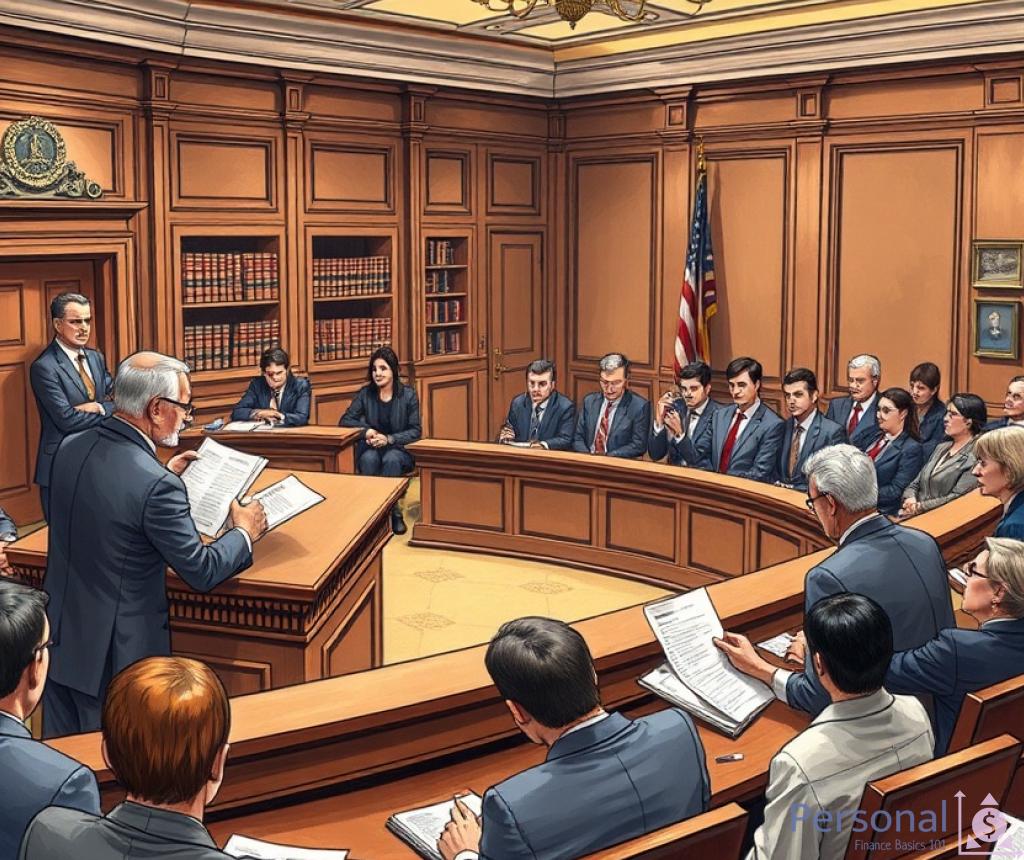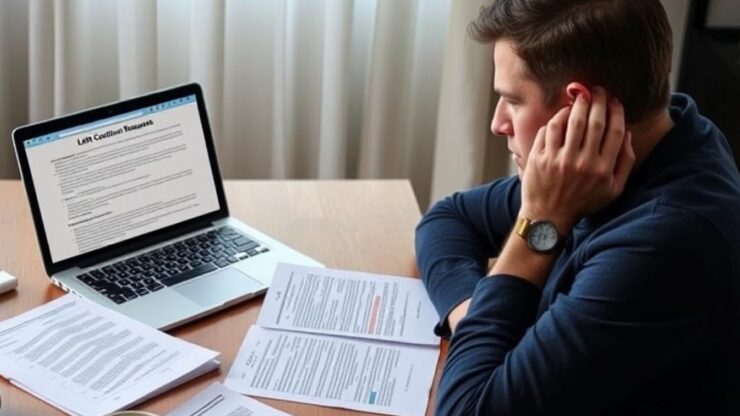Understanding the Lawsuit Process

The Initial Notice: What to Expect
Receiving a notice of a debt collection lawsuit can be alarming, but understanding the initial steps can ease some of the anxiety. This notice typically outlines the amount owed and the creditor’s claims against you. It is essential to read this document carefully, as it sets the stage for the ensuing legal process.
In many cases, this initial notice will inform you of your rights and the steps you need to take to respond. Ignoring this notice can lead to serious consequences, including default judgments against you.
Understanding Your Rights and Obligations
Once you have received the lawsuit notice, it is crucial to be aware of your rights and obligations. The Fair Debt Collection Practices Act (FDCPA) provides consumers with protections against abusive practices by debt collectors. Knowing these rights can empower you in the legal process.
For instance, you have the right to dispute the debt, request validation, and be free from harassment. On the other hand, you are obligated to respond to the lawsuit in a timely manner, typically within 30 days of receiving the notice, to avoid a default judgment.
Navigating the Legal Proceedings: Steps to Take
Understanding the legal proceedings involved in a debt collection lawsuit is critical for an effective response. Below is a comprehensive list of steps you should consider when navigating this process:
- Review the Complaint: Carefully analyze the complaint to understand the claims against you.
- Gather Documentation: Collect all relevant documents, including previous correspondence with the creditor.
- Respond Appropriately: Draft a formal response or answer to the court, addressing each claim made in the complaint.
- Consider Legal Representation: If possible, consult with an attorney who specializes in debt collection cases.
- Prepare for Court: If the case proceeds, prepare your arguments and any evidence for the court hearing.
By following these steps, you can effectively respond to a debt collection lawsuit and protect your rights throughout the legal process.
Gathering Evidence and Documentation

Building Your Defense: The Importance of Evidence
When faced with a debt collection lawsuit, one of the most crucial steps is gathering evidence and documentation. This process is not merely about collecting papers; it requires a strategic approach to assemble a compelling defense. The documentation you compile will serve as the backbone of your case and can significantly influence the outcome. Properly organized evidence not only aids in your defense but also demonstrates to the court your commitment to addressing the claims made against you.
Types of Evidence to Collect
As you prepare to respond to a lawsuit, it is essential to identify the types of evidence that can support your position. Start with correspondence related to the debt, including emails, letters, and texts exchanged with the creditor or collection agency. This communication can provide insights into the nature of the debt and any negotiations that have taken place. Next, gather financial records, such as bank statements and payment history, which can help establish whether the debt is valid or if there have been any discrepancies. Additionally, collect any relevant legal documents, such as previous court orders or agreements, which might impact your case.
It’s important to note that if the debt collector has violated the Fair Debt Collection Practices Act (FDCPA), documentation of those violations can bolster your defense. For instance, if you have records showing harassment or improper communication tactics, these can be pivotal in your argument.
Organizing Your Evidence: A Key Strategy
Once you have collected the necessary documents, organization is key. Create a systematic method to categorize your evidence, which will make it easier to reference during court proceedings. Consider using a digital or physical binder to compile your materials, separating them by type and relevance. This organization not only aids in your own preparation but also presents a professional image to the court.
In summary, gathering evidence and documentation is a vital component of responding to a debt collection lawsuit. The quality and organization of your evidence can greatly affect the court’s perception of your case. By taking the time to collect and present your documentation thoughtfully, you enhance your ability to defend against the claims effectively.
Crafting an Effective Response
Responding to a debt collection lawsuit involves more than just submitting an answer to the court; it requires a strategic approach that can significantly impact the outcome of your case. An effective response is your opportunity to contest the claims made against you and to assert your legal rights. By preparing a well-structured response, you can lay the groundwork for a favorable resolution and potentially avoid further complications.
Structuring Your Response: Key Elements
When crafting your response, it’s essential to include specific components that address the allegations in the complaint. An organized and thorough response not only demonstrates your seriousness in contesting the lawsuit but also provides clarity to the court. Below are the key elements that should be included in your response:
- Caption: Start with the case title, including the names of both parties, the case number, and the court where the lawsuit was filed.
- Introduction: Briefly introduce yourself and state your intention to respond to the complaint.
- Admissions and Denials: Clearly admit or deny each allegation made in the complaint. This section should be precise and directly correspond to the claims.
- Affirmative Defenses: If applicable, state any affirmative defenses you may have, such as statute of limitations or discharge in bankruptcy.
- Conclusion: Summarize your position and request the court to dismiss the case or provide any other relief you may be entitled to.
Tips for an Impactful Response
Creating an effective response requires careful consideration of both legal and procedural aspects. Here are some tips to enhance the impact of your response:
- Be Concise: Avoid unnecessary details. Stick to the facts pertinent to your case.
- Use Clear Language: Legal jargon can be confusing. Use simple and straightforward language to articulate your points.
- Consult Legal Counsel: If unsure about your response, seek advice from a qualified attorney who specializes in debt collection cases.
By implementing these strategies, you enhance your chances of a successful outcome in your debt collection lawsuit. Remember, your response is not merely a formality; it is a vital component of your defense that can shape the direction of the legal proceedings.
Exploring Settlement Options
When faced with a debt collection lawsuit, one of the most viable paths you can consider is exploring settlement options. Settling a debt can often lead to a quicker resolution and may be less stressful than proceeding through a lengthy court process. This approach not only allows you to save on legal costs but also gives you the opportunity to negotiate terms that work for your financial situation. Understanding the nuances of settlement can empower you to make informed decisions about how to proceed.
Understanding the Settlement Process
The settlement process typically involves negotiations between you and the creditor or collection agency. This can begin with an initial offer from the collector, often significantly lower than the total amount owed. It’s important to approach these negotiations with a clear understanding of your financial capabilities and limitations. You should also be prepared to present your case, highlighting any evidence or documentation that supports your position. This might include proof of financial hardship or inconsistencies in the debt itself.
Highlighting the Benefits of Settling
Opting for a settlement can yield several benefits. Firstly, it can lead to a reduction in the total amount owed, allowing you to pay off the debt for less than what was originally claimed. Additionally, settling a debt can help you avoid the negative consequences of a court judgment, which can affect your credit score and financial future. Furthermore, once settled, the creditor should report the debt as “settled” or “paid,” which, while not as favorable as “paid in full,” is still better than an unresolved debt.
Negotiating the Terms of Settlement
Negotiation is a critical component of the settlement process. When entering negotiations, consider proposing a payment plan that aligns with your financial capabilities. This can demonstrate your intention to resolve the matter while also ensuring that you do not overextend yourself financially. Be prepared for the possibility of counteroffers; creditors may not accept your first offer but could be willing to negotiate further.
Understanding the Consequences of Settlement
While settling a debt has its advantages, it’s important to be aware of the potential consequences as well. Settling for less than the full amount may have tax implications, as forgiven debt can be considered taxable income by the IRS. Additionally, a settled debt will still have a negative impact on your credit report, albeit less severe than a judgment. It’s advisable to consult with a financial advisor or tax professional to fully understand the implications of settling your debt.
Weighing Your Options
Ultimately, the decision to settle should be made after careful consideration of all available options. Compare the costs and benefits of settling versus continuing with litigation. If the potential for a settlement offers a clear path to resolving your debt without further complications, it may be the preferable choice. On the other hand, if you believe you have strong grounds for contesting the lawsuit or if the debt is invalid, pursuing a defense may be more beneficial.
In conclusion, exploring settlement options can provide an effective means of addressing a debt collection lawsuit. By understanding the settlement process, recognizing the benefits and consequences, and weighing your options carefully, you can make a more informed decision that aligns with your financial goals.
Preparing for Court Appearance
Understanding the Importance of Preparation
Preparing for a court appearance in a debt collection lawsuit is a critical step that can significantly influence the outcome of your case. It is not merely about showing up; it involves thorough preparation that demonstrates your seriousness and commitment to defending yourself. A well-prepared individual can effectively articulate their position, potentially swaying the judge’s opinion in their favor. Additionally, a lack of preparation may lead to unfavorable consequences, including the possibility of a default judgment against you.
Essential Elements for a Successful Court Appearance
Every aspect of your court appearance requires meticulous attention, from understanding courtroom etiquette to presenting your evidence effectively. First and foremost, familiarize yourself with the court’s rules and procedures, as each jurisdiction may have its specific protocols. Arriving on time is imperative; being punctual reflects respect for the court and demonstrates your seriousness regarding the case. Dress appropriately in business attire to project professionalism and respect for the legal process. Additionally, practice articulating your arguments clearly and concisely, which will help you communicate your defense effectively during the hearing.
Moreover, having all your documents organized and easily accessible is vital. Create a comprehensive folder that includes your evidence, correspondence, and any relevant legal documents. This organization allows you to present your materials seamlessly and respond to any queries from the judge or opposing counsel. When presenting your evidence, focus on clarity. Use simple language to explain your position and avoid jargon that may confuse the court.
Engaging with the Court and Opposing Counsel
During the court proceedings, it is essential to engage respectfully with both the judge and opposing counsel. Address the judge as “Your Honor” and maintain a polite demeanor throughout the proceedings. If you disagree with something presented by the opposing side, it is crucial to remain calm and composed. You can address your disagreements during your turn to speak, ensuring that your arguments are reasoned and based on the evidence you have gathered.
As the case unfolds, remember that listening is just as important as speaking. Pay close attention to the arguments made by the opposing counsel and the questions posed by the judge. This attentiveness can provide you with insights into the court’s perspective and may help you adjust your strategy as needed. Ultimately, your goal is to convey confidence and clarity, demonstrating to the court that you are both informed and prepared to defend your position effectively.
Disclaimer
This article has been created or edited with the support of artificial intelligence and is for informational purposes only. The information provided should not be considered investment advice. Please seek the support of a professional advisor before making any investment decisions.






